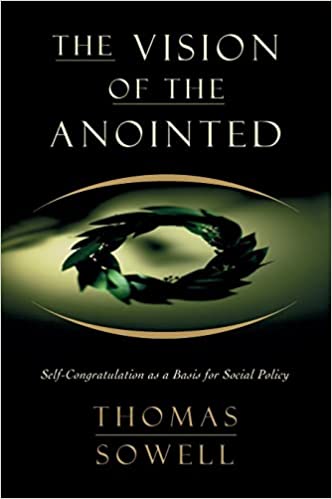A Brief Book Summary from Books At a Glance
by Benjamin J. Montoya
About the Author
Thomas Sowell is a senior fellow at the Hoover Institution, Stanford University. He is the author of dozens of books including Charter Schools and Their Enemies, winner of the 2021 Hayek Book Prize. He is the recipient of numerous other awards, including the National Humanities Medal, presented by the President of the United States in 2003.
Introduction
Our society is filled with people who view themselves as anointed with a vision that is based on convictions of a different sort. What is this vision? Who are these people? Why and how has their vision become so influential that it has affected society at large? Consider this summary to learn more.
Table of Contents
Chapter 1 Flattering Unction
Chapter 2 The Pattern
Chapter 3 By the Numbers
Chapter 4 The Irrelevance of Evidence
Chapter 5 The Anointed versus the Benighted
Chapter 6 Crusades of the Anointed
Chapter 7 The Vocabulary of the Anointed
Chapter 8 Courting Disaster
Chapter 9 Optional Reality
Summary
Chapter 1: Flattering Unction
There is a certain vision that is prevalent in our day just as there have been various associated visions in times past. Today’s prevailing vision is markedly different from visions of previous ages. Instead of allowing itself to be questioned, critiqued, improved upon, etc., this vision does not allow anything of the sort. This vision claims that it is concerned with the environment, the less fortunate, claiming minorities as an example, and their view of justice. This vision also prides itself on being anti-war. Although these things may sound good on the surface and seem quite admirable, there is more to watch because their concern for these various issues is not what it seems. This vision originates from the political left and the result is such that they want to see a new kind of government exercise its authority to coerce people to join this vision.
Four steps characterize how this vision is enacted:
- Assertions of a great danger to the whole society, a danger to which the masses of people are oblivious.
- An urgent need for action to avert impending catastrophe.
- A need for government to drastically curtail the dangerous behavior of the many, in response to the prescient conclusions of the few.
- A disdainful dismissal of arguments to the contrary as either uninformed, irresponsible, or motivated by unworthy purposes.
Although this vision is very popular and prevailing among many elites, many people disagree. Milton Friedman, Friedrich Hayek, Karl Popper, Edward Ban-field, Irving Kristol, and Norman Podhoretz—people who once were part of this vision—now disagree and have voiced their thoughts to the contrary. Their reasons are many, and the various chapters of this book will touch on these topics. The larger goal of this book is to help people understand this vision, and the next chapter will identify the patterns of the vision. . . .
[To continue reading this summary, please see below....]The remainder of this article is premium content. Become a member to continue reading.
Already have an account? Sign In
